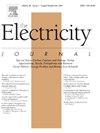House and socio-demographic features vs. electricity consumption time series in main heating mode classification
IF 2.2
Q1 Social Sciences
引用次数: 0
Abstract
Demand-side flexibility is crucial for integrating variable renewable energy sources cost-effectively. Home heating systems determine the potential for flexibility in individual households. We examine different approaches to classify heating systems in Finland and find that using hourly electricity consumption time series is more effective than house and socio-demographic features. Classification based on electricity consumption data achieves higher precision (0.62) and recall (0.64) than house and socio-demographic features (0.41 and 0.43, respectively). Therefore, the availability of electricity consumption time series data should be considered from a competition policy perspective due to its value in estimating flexibility potential.
主要取暖方式分类中的房屋和社会人口特征与耗电量时间序列对比
需求方的灵活性对于以具有成本效益的方式整合可变可再生能源至关重要。家庭供暖系统决定了每个家庭的灵活性潜力。我们研究了芬兰供暖系统分类的不同方法,发现使用每小时耗电量时间序列比使用房屋和社会人口特征更有效。与房屋和社会人口特征(分别为 0.41 和 0.43)相比,基于用电量数据的分类精确度(0.62)和召回率(0.64)更高。因此,从竞争政策的角度来看,应考虑用电量时间序列数据的可用性,因为它在估算灵活性潜力方面具有重要价值。
本文章由计算机程序翻译,如有差异,请以英文原文为准。
求助全文
约1分钟内获得全文
求助全文
来源期刊

Electricity Journal
Business, Management and Accounting-Business and International Management
CiteScore
5.80
自引率
0.00%
发文量
95
审稿时长
31 days
期刊介绍:
The Electricity Journal is the leading journal in electric power policy. The journal deals primarily with fuel diversity and the energy mix needed for optimal energy market performance, and therefore covers the full spectrum of energy, from coal, nuclear, natural gas and oil, to renewable energy sources including hydro, solar, geothermal and wind power. Recently, the journal has been publishing in emerging areas including energy storage, microgrid strategies, dynamic pricing, cyber security, climate change, cap and trade, distributed generation, net metering, transmission and generation market dynamics. The Electricity Journal aims to bring together the most thoughtful and influential thinkers globally from across industry, practitioners, government, policymakers and academia. The Editorial Advisory Board is comprised of electric industry thought leaders who have served as regulators, consultants, litigators, and market advocates. Their collective experience helps ensure that the most relevant and thought-provoking issues are presented to our readers, and helps navigate the emerging shape and design of the electricity/energy industry.
 求助内容:
求助内容: 应助结果提醒方式:
应助结果提醒方式:


